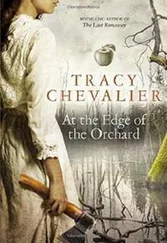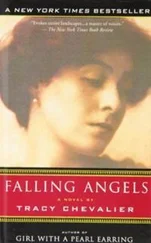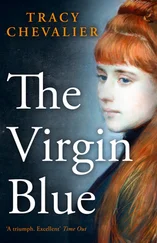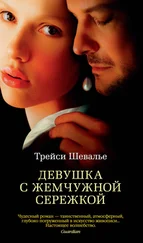This is more like it, I thought.
I pulled over near the summit at a place called the Col de Finiels and sat on the hood of the car. After a few minutes the automatic fan cut out and it was wonderfully quiet; I listened and could hear a few birds and the dull roar of the wind. According to my map, to the east across a small pine forest and over a hill was the source of the Tarn. I was tempted to go and look for it.
Instead I drove down the other side of the mountain, zigzagging back and forth, until one last turn brought me coasting into Le Pont de Montvert, passing a hotel, a school, a restaurant, a few shops and bars on one side of the road. Paths branched off the main road, winding among the houses built up the hill. Above the tops of the houses I could see the roof of a church; a bell hung in the stone belfry.
I caught a glimpse of water on the other side of the road, where the Tarn ran, hidden by a low stone wall. I parked by an old stone bridge, walked onto it and looked down at the river.
The Tarn had changed completely. No longer wide and slow, it was twenty feet across at most and racing like a stream. I studied the pebbles in deep reds and yellows gleaming under the water. I could hardly tear my eyes away.
This water will flow all the way to Lisle, I thought. All the way to me.
It was Wednesday, ten a.m. Jean-Paul could be sitting at the café, watching the river too.
Stop it, Ella, I thought sharply. Think of Rick, or don't think at all.
From the outside the mairie – a grey building with brown shutters and a French flag hanging limply over one of the windows – was presentable enough. Inside, though, it looked like a junk shop; the sun streamed through a fog of dust. Monsieur Jourdain was reading a newspaper at a desk in the far corner. He was short and plump, with bulging eyes, olive skin and one of those scraggly beards that peters out halfway down the neck and blurs the jaw line. He eyed me suspiciously as I picked my way through battered old furniture and stacks of paper.
‘ Bonjour, Monsieur Jourdain ,’ I said briskly.
He grunted and glanced down at his paper.
‘My name is Ella Turner – Tournier,’ I continued carefully in French. ‘I would like to look at some records you keep here at the mairie . There's a compoix from 1570. May I see it?’
He looked up at me briefly, then continued reading the paper.
‘Monsieur? You are Monsieur Jourdain, yes? They told me in Mende that I should speak to you.’
Monsieur Jourdain ran his tongue around his teeth. I looked down. He was reading a sports newspaper, the pages open to the racing form.
He said something I didn't understand. ‘ Pardon ?’ I asked. Again he spoke incomprehensibly and I wondered if he was drunk. When I asked him once more to repeat himself, he waved his hands and flecked spit at me, unleashing a torrent of words. I took a step back.
‘Jesus, what a stereotype!’ I muttered in English.
He narrowed his eyes and snarled, and I turned and left. I sat fuming over a coffee in a café, then found the number of the Mende archives and called Mathilde from a pay phone.
She shrieked when I explained what had happened. ‘Leave it to me,’ she counselled. ‘Go back in half an hour.’
Whatever Mathilde said to Monsieur Jourdain over the phone worked, because although he glared at me he led me down a hall to a cramped room containing a desk overflowing with papers. ‘ Attendez ,’ he mumbled, and left. I seemed to be in a storage room; while waiting I poked around. There were boxes of books everywhere, some very old. Stacks of papers that looked like government documents lay on the floor, and a big pile of unopened envelopes was scattered on the desk, all addressed to Abraham Jourdain.
After ten minutes he reappeared with a large box and dumped it onto the desk. Then without a word or glance he walked out.
The box held a book similar to the compoix in Mende, but even bigger and in worse shape. The calfskin binding was so ragged it no longer held the pages together. I handled the book as carefully as I could, but even so bits of corners crumbled and broke off. I hid the fragments furtively in my pockets, worried that Monsieur Jourdain might find them and yell at me.
At noon he threw me out. I'd only been working an hour when he appeared in the doorway, glared down at me and growled something. I could only work out what he meant because he tapped his watch. He stumped down the hall to open the front door, shutting it behind me with a thud and drawing the bolt. I stood blinking in the sunlight, dazed after the dark, dusty room.
Then I was surrounded by children, streaming out from a playground next door.
I breathed in. Thank God, I thought.
I bought things for lunch in the shops just as they were closing: cheese and peaches and some dark red bread the shopkeeper told me was a local specialty, made from chestnuts. I took a path up through granite houses to the church at the top of the village.
It was a simple stone building, almost as wide as it was high. What I took to be the front door was locked, but around the side I found an open door, the date 1828 carved over it, and stepped inside. The room was full of empty wooden pews. Balconies skirted the two long walls. There was a wooden organ, a lectern and a table with a large Bible lying open on it. That was all. No ornamentation, no statues or crosses, no stained glass. I'd never seen such a bare church. There wasn't even an altar to distinguish the minister's place from the people's.
I went over to the Bible, the only thing there with a use beyond the purely functional. It looked old, though not as old as the compoix I'd been looking at. I began to leaf through it. It took awhile – I didn't know the order of the books in the Bible – but at last I found what I was looking for. I began to read the thirty-first psalm: J'ai mis en toi mon espérance: Garde-moi donc, Seigneur . By the time I reached the first line of the third verse, Tu es ma tour et forteresse , my eyes were full of tears. I stopped abruptly and fled.
Silly girl, I scolded myself as I sat on the wall around the church and wiped my eyes. I made myself eat, blinking in the bright sun. The chestnut bread was sweet and dry, and stuck in the back of my throat. I could feel it there for the rest of the day.
When I got back Monsieur Jourdain was sitting behind his desk, hands clasped in front of him. He wasn't reading his paper; in fact it looked like he was waiting for me. I said carefully, ‘ Bonjour, Monsieur . May I have the compoix , please?’
He opened a filing cabinet next to his desk, pulled out the box and handed it to me. Then he looked closely at my face.
‘What is your name?’ he asked in a puzzled voice.
‘Tournier. Ella Tournier.’
‘Tournier,’ he repeated, still scrutinizing me. He twisted his mouth to one side, chewing the inside of his cheek. He was staring at my hair. ‘ La Rousse ,’ he murmured.
‘What?’ I snapped loudly. A wave of goosebumps swept over me.
Monsieur Jourdain widened his eyes, then reached over and touched a lock of my hair. ‘ C'est rouge. Alors, La Rousse .’
‘But my hair is brown, Monsieur.’
‘ Rouge ,’ he repeated firmly.
‘Of course it's not. It's -’ I pulled a clump of hair in front of my eyes and caught my breath. He was right: it was shot through with coppery highlights. But it had been brown when I'd looked at myself in the mirror that morning. The sun had brought out highlights in my hair before, but never so fast or so dramatically.
‘What is La Rousse?’ I asked accusingly.
‘It's a Cevenol nickname for a girl with red hair. It's not an insult,’ he added quickly. ‘They used to call the Virgin La Rousse because they thought she had red hair.’
Читать дальше
Конец ознакомительного отрывка
Купить книгу
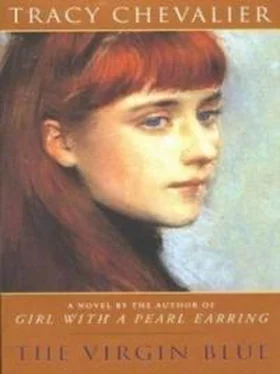
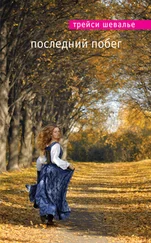
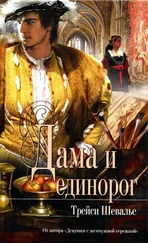

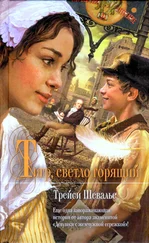

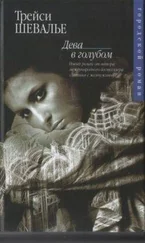
![Трейси Шевалье - Тонкая нить [Литрес]](/books/386177/trejsi-shevale-tonkaya-nit-litres-thumb.webp)
